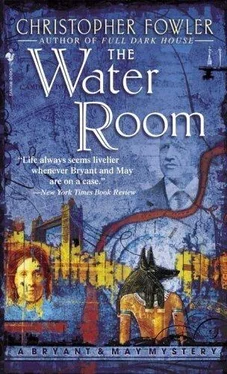Christopher Fowler - The Water Room
Здесь есть возможность читать онлайн «Christopher Fowler - The Water Room» весь текст электронной книги совершенно бесплатно (целиком полную версию без сокращений). В некоторых случаях можно слушать аудио, скачать через торрент в формате fb2 и присутствует краткое содержание. Год выпуска: 2006, Жанр: Детектив, на английском языке. Описание произведения, (предисловие) а так же отзывы посетителей доступны на портале библиотеки ЛибКат.
- Название:The Water Room
- Автор:
- Жанр:
- Год:2006
- ISBN:нет данных
- Рейтинг книги:5 / 5. Голосов: 1
-
Избранное:Добавить в избранное
- Отзывы:
-
Ваша оценка:
- 100
- 1
- 2
- 3
- 4
- 5
The Water Room: краткое содержание, описание и аннотация
Предлагаем к чтению аннотацию, описание, краткое содержание или предисловие (зависит от того, что написал сам автор книги «The Water Room»). Если вы не нашли необходимую информацию о книге — напишите в комментариях, мы постараемся отыскать её.
The Water Room — читать онлайн бесплатно полную книгу (весь текст) целиком
Ниже представлен текст книги, разбитый по страницам. Система сохранения места последней прочитанной страницы, позволяет с удобством читать онлайн бесплатно книгу «The Water Room», без необходимости каждый раз заново искать на чём Вы остановились. Поставьте закладку, и сможете в любой момент перейти на страницу, на которой закончили чтение.
Интервал:
Закладка:
Kershaw barely managed to tumble out of the car before Bryant crashed the gears and jerked away from the car park, into the teeming city night.
Someone in the street knew more than they were telling.
Curtains, doors and thick brick walls, blinds and shutters to exclude light and rain and other people, to keep out warmth and kindness and cold hard truth. Anything to keep lives hidden from view. Was there anything more subtly malicious than the lowland mentality of people in cool climates? England in the rain, wet gardens, chilly rooms, London dinner conversations over pudding served in xanthous light, hushed arguments behind amber supper candles, quietly spreading the poison of rationality.
This won’t do, Kallie thought. I’ll go crazy.
When the letterbox clapped, she picked the postcard from the mat and turned it over. A picture of Cairo at night. The photograph looked old and artificially coloured. Tall hotels reflected in a flat wide river, a sheet of dark light pierced with luminous neon streaks. She could almost have been looking at London after dark, except that there were more boats. On the back, a handful of lines, something about a change of plan. He had the nerve to add that he was missing her. Then come home, she almost said aloud, then fought down the plea.
What was wrong with the men she knew? Paul didn’t have the guts to stay with her through the settling-in period of their relationship, presumably because it involved some responsibility. His brother barely spoke to his girlfriend unless he wanted sex. Heather’s husband was trading her in for someone younger. And the other men in the street: Mark Garrett in a state of belligerent inebriation, Randall Ayson accused by his wife of infidelity (according to Jake, who shared the party wall), Oliver communicating with his wife via their morose son, Elliot lonely and antisocial, coming to an ignominious but probably inevitable end in a mud-filled ditch. It didn’t say much for the men of the twenty-first century. Omar and Fatima next door-she didn’t know enough about them to be critical, but having seen Fatima in the street, head covered and bowed, mincing invisibly in her husband’s shadow, the urge to do so was tempting.
The infinite dark skies made her as fractious as a school-bound child. She wished the walls that separated them all would melt away to reveal their communal lives. Brick, lathe, gypsum, plywood, plaster, paper, dissolving all along the terrace. Ten houses, at least twenty-five people by her reckoning, most interacting more with their computers and televisions than with their neighbours, because there was too little time and too much uncertainty.
And what would others think of her? The new girl at number 5 arrived with hardly any furniture, her boyfriend lost his job and didn’t stick around, now she watches the world splash past from her misted lounge window. This has got to stop, she told herself, throwing the postcard into the bin, knowing that she would later retrieve it. Pulling a blanket from the sofa, she wrapped herself and, opening the back door, sat on the step to watch the deluge. She had always loved the fulgent clouds, rain-circles in swirling pools, burgeoned leaves releasing droplets, roots drawing sustenance through dense weeds. In London, the ever-present water brought survival and regrowth. The sun only dried and desiccated, making pavements sweat and people uncomfortable.
It seemed as if her trace-memories were entirely filled with water: shops with dripping canopies, passers-by with plastic macs or soaked shoulders, huddled teenagers in bus shelters peering out at the downpour, shiny black umbrellas, children stamping through puddles, buses slooshing past, fishmongers hauling in their displays of sole and plaice and mackerel in brine-filled trays, rainwater boiling across the tines of drains, split gutters with moss hanging like seaweed, the oily sheen of the canals, dripping railway arches, the high-pressure thunder of water escaping through the lock-gates in Camden, fat drops falling from the sheltering oaks in Greenwich Park, rain pummelling the opalescent surfaces of the deserted lidos at Brockwell and Parliament Hill, sheltering swans in Clissold Park; and indoors, green-grey patches of rising damp, spreading through wallpaper like cancers, wet tracksuits drying on radiators, steamed-up windows, water seeping under back doors, faint orange stains on the ceiling that marked a leaking pipe, a distant attic drip like a ticking clock.
She looked through the rain and saw him, a hunched old man with monkey eyes, brown and watchful. According to Sergeant Longbright, the tramp’s name was Tate; that was what everyone had always called him. Now here he was again, waiting, keeping guard, willing something to happen.
Call us if he reappears. She didn’t like to bother them, but they had insisted on her using the number. She punched out the hotline digits on the Peculiar Crimes Unit card.
Meera Mangeshkar looked up from sixty pages of hardcopy, listening to the call-out. She had been trying to absorb city stats for the last two hours, but hated coursework. Forty-three police forces. Around 130,000 officers in UK, just one for every 400 civilians. 20,000 women, only 2,500 ethnic. The Met’s five areas were each the size of a complete force elsewhere in the country, but could still barely cope. Over six million 999 calls a year. 5,000 cars a month stolen in London, figures rising fast. Borough of Camden has the highest suicide rate in London.
What was the point of familiarizing yourself with the figures when you could do nothing about them? Raise the strike rate, drop kids into the criminal-justice system, watch them re-offend, pick up the pieces, console the latest victims. She had been on the edge of leaving the Met before her transfer, and still hoped that this unit would make a difference to the way she felt. The old guys had made her welcome, and John May, in particular, had gone out of his way to spend time explaining the unit’s unorthodox structure, but where were the interesting cases? When the call came through she took it, calling to Colin Bimsley as he was about to go off duty.
‘You can handle this, Meera. She’s seen the tramp before-just give him a warning, find out where he’s staying and take him back there.’
‘I know how to do my job, sonny,’ she yelled back. ‘I thought you might want to come with me.’
In the next room, Bimsley buttoned his shirt and threw his boots into his locker. ‘What, like a date or something?’
‘No, not a date, but you could give me a lift on your scooter.’
‘Only if we get something to eat afterwards, I’m starving. Look at the weather, it’s still pissing down. I could wait for you, then we could grab a takeaway and eat it at my flat. .’
She could see where he was going with this. ‘Forget it, Colin, you’re so not my type.’
‘ “Not my type”?’ he mouthed to himself, amazed. He stuck his head around the door. ‘I’m clean-living, kind-hearted and pathetically single. If you’re going to pass on this great opportunity, can you at least fix me up with a date?’
‘Sure. My sister would like you. She’s cute and she might even go out with you. Just say the word and I’ll arrange it. But I warn you, she’s a Muslim.’
‘Would she really? What difference does it make, her being a Muslim?’
‘She’ll only go out with a Muslim boy, so you’d have to give up the beer,’ Meera told him. ‘And Muslims are circumcised, so you might need a small operation.’
‘Jesus, Meera, you have a sick sense of humour.’
‘What’s the matter, Colin? Feeling threatened? Now you know how I feel when you pester me.’
‘I think you spent too much time roughing it in the south London stations.’ Colin kicked his locker door shut. ‘Come on then. I’ll give you a lift, no strings attached.’
Читать дальшеИнтервал:
Закладка:
Похожие книги на «The Water Room»
Представляем Вашему вниманию похожие книги на «The Water Room» списком для выбора. Мы отобрали схожую по названию и смыслу литературу в надежде предоставить читателям больше вариантов отыскать новые, интересные, ещё непрочитанные произведения.
Обсуждение, отзывы о книге «The Water Room» и просто собственные мнения читателей. Оставьте ваши комментарии, напишите, что Вы думаете о произведении, его смысле или главных героях. Укажите что конкретно понравилось, а что нет, и почему Вы так считаете.












